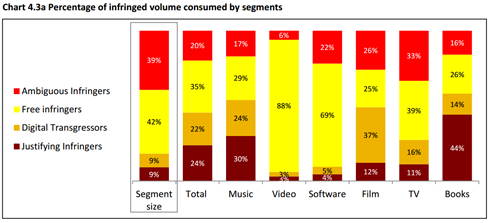Video streaming giant Netflix believes that making content available is the best way to beat online piracy, and the company has data to back this up. Netflix Chief Content Officer Ted Sarandos reveals that ISPs are noticing a drop in BitTorrent traffic every time they launch in a new territory. “The best way to combat piracy isn’t legislatively or criminally but by giving good options,” Sarandos says.
With nearly 30 million streaming subscribers in the U.S. alone, Netflix is one the major providers of online video entertainment.
That’s quite an achievement, especially when taking into consideration that streaming Hollywood blockbusters was virtually impossible half a decade ago.
Furthermore, with the rise of these legal options people have less incentive to search for pirated copies on file-sharing sites – two years ago we noted that Netflix was killing (unauthorized) BitTorrent traffic. Now Netflix’s Chief Content Officer Ted Sarandos reports he has some evidence to back up this claim.
In a recent interview with Stuff, Sarandos notes that BitTorrent traffic dips every time the video provider opens up shop in a new location.
“One of the things is we get ISPs to publicise their connection speeds – and when we launch in a territory the BitTorrent traffic drops as the Netflix traffic grows. So I think people do want a great experience and they want access – people are mostly honest.”
In other words, many people who previously pirated movies via BitTorrent stop doing so when Netflix becomes available. Choice is also the key to solving the piracy problem according to the Netflix CCO.
“The best way to combat piracy isn’t legislatively or criminally but by giving good options,” Sarandos says.
It’s not rocket science and quite logical to most, but still there are many parts of the world where movie and TV streaming options are rather limited. Even in the United States some releases are held back or delayed to save old business models.
According to Sarandos this has to change – people want to consume Hollywood content and need legal options to do so.
“One of the side effects of growth of content is an expectation to have access to it. You can’t use the Internet as a marketing vehicle and then not as a delivery vehicle,” he says.
There’s still a lot can be done to improve the current situation. Since the launch of Netflix’s streaming service in 2008, BitTorrent traffic has continued to rise in the United States, but it’s indicative that Game of Thrones is one of the most pirated titles of all time.
After all, HBO is not making it easy for people to access the show and Netflix is unable to buy it.
Of course, there are many reasons why people pirate and there will always be freeloaders who simply can’t or won’t pay. But this is no reason to offend those who have the right intentions.
Making content available may not make piracy disappear, but at the very minimum it gives the millions of people who want to pay a place to spend their money.
Torrent Invites! Buy, Trade, Sell Or Find Free Invites, For EVERY Private Tracker! HDBits.org, BTN, PTP, MTV, Empornium, Orpheus, Bibliotik, RED, IPT, TL, PHD etc!
Results 1 to 5 of 5
-
05-04-2013 #1Extreme User




















- Reputation Points
- 18279
- Reputation Power
- 100
- Join Date
- Mar 2011
- Posts
- 8,107
- Time Online
- 49 d 22 h 37 m
- Avg. Time Online
- 16 m
- Mentioned
- 79 Post(s)
- Quoted
- 85 Post(s)
- Liked
- 3024 times
- Feedbacks
- 321 (100%)
Netflix Says It's 'Killing' BitTorrent Traffic
-
05-04-2013 #2User



- Reputation Points
- 10
- Reputation Power
- 46
- Join Date
- Dec 2012
- Posts
- 40
- Time Online
- 1 h 5 m
- Avg. Time Online
- N/A
- Mentioned
- 0 Post(s)
- Quoted
- 0 Post(s)
- Liked
- 3 times
- Feedbacks
- 0
this is pure BULLSH_T on nutf_cks part. piracy is down because movie and music sales are down. every year that the music or movie industry has had their highest sales piracy has been at it highest. the year when sales have been low piracy has gone down accordingly. H_LL i just downloaded nutf_cks entire first season for hemlock grove.
Sharing Shall Not Be My Enemy, Sharing Shall Be My Friend,
And Together I Shall Strike Courage Into The Hearts Of Those Fearful Of Sharing
-
05-04-2013 #3Donor





















- Reputation Points
- 4813
- Reputation Power
- 100
- Join Date
- Mar 2011
- Posts
- 3,805
- Time Online
- 3 d 14 h 47 m
- Avg. Time Online
- 1 m
- Mentioned
- 9 Post(s)
- Quoted
- 12 Post(s)
- Liked
- 471 times
- Feedbacks
- 158 (100%)
That's no so true, even if music and movie sales are low they are still being released therefor can be pirated, so low sales and piracy have no relation to each other and if they did it would be because everyone is downloading the content illegally and not paying for it.
The reason piracy in torrenting is down is the fact that unfortunately the torrent world is slowly dying and streaming is on the up.
-
05-05-2013 #4User



- Reputation Points
- 10
- Reputation Power
- 46
- Join Date
- Dec 2012
- Posts
- 40
- Time Online
- 1 h 5 m
- Avg. Time Online
- N/A
- Mentioned
- 0 Post(s)
- Quoted
- 0 Post(s)
- Liked
- 3 times
- Feedbacks
- 0
the facts speak for themselves. when movie / music sales were at their highest piracy was at it's highest, when sales went back down so did piracy. regardless of claims for every torrent site taken down at least 3 more are opened. some forums that have been using services like mega, mediafire, upload, etc... have been converting to torrents. if anything the use of torrents is on the increase.
Sharing Shall Not Be My Enemy, Sharing Shall Be My Friend,
And Together I Shall Strike Courage Into The Hearts Of Those Fearful Of Sharing
-
05-10-2013 #5User



- Reputation Points
- 10
- Reputation Power
- 46
- Join Date
- Dec 2012
- Posts
- 40
- Time Online
- 1 h 5 m
- Avg. Time Online
- N/A
- Mentioned
- 0 Post(s)
- Quoted
- 0 Post(s)
- Liked
- 3 times
- Feedbacks
- 0
Sharing Shall Not Be My Enemy, Sharing Shall Be My Friend,
And Together I Shall Strike Courage Into The Hearts Of Those Fearful Of Sharing


 3Likes
3Likes LinkBack URL
LinkBack URL About LinkBacks
About LinkBacks




 Reply With Quote
Reply With Quote












